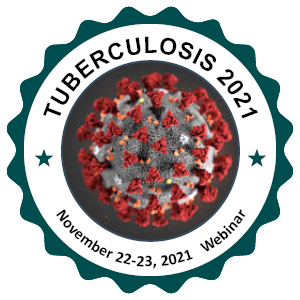
Dheenadayalu Nageswari
Respiratory Diseases. She was trained by Central Govt. of India
Title: Effect of Ripampin With Bio-Enhancer In The Treatment Of Newly Diagnosed Sputum Positive Pulmonary Tuberculosis Patients: A Double –Centre Study
Biography
Biography: Dheenadayalu Nageswari
Abstract
Tuberculosis was declared as global emergency by WHO in 1993. DOTS Therapy recommended by WHO is highly effective in an active drug susceptible TB as long as patient completes the course. Adverse effect of anti TB drugs is one of the most common reasons for non-adherence eventually contributing to treatment failure, relapse or emergence of drug resistance. The standard treatment for newly diagnosed tuberculosis patients consists of an intensive phase for two months with 4drugs (HRZE), followed by continuation phase for four months with 2 drugs (HR). Rifampicin, which is very effective against mycobacterium tuberculosis, in both phase of treatment, has certain concerns, which included decreased bioavailability with chronic use and hepatotoxicity. To overcome these concerns a new boosted formulation of Rifampicin (Risorine) with bio-enhancer of piparine was developed. Piperine has been found to increase bioavailablity of several drugs including Amoxicillin, Cefotaxime, Theophylline and Propanolol. Risorine is a fixed combination contains Rifampicin 200mg+Isonazid300mg+Piperine 10mg. We conducted study in two centres to validate the therapeutic efficacy and tolerablity of Risorine formulation containing regimen with a conventional regimen. This was a randomized, prospective, parallel group study . All the patients were subjected to sputum examination, biochemical investigations followed by adverse drug event (ADE) monitoring. A Total of 63 patients completed the study. No significant difference was observed in baseline characteristics of patients between the study groups. At the end of the continuous phase, both the groups showed zero bacteria detection. However, in the intervention group, the rate of sputum conversion was much faster than the usual care group. The rate of increase in SGOT and SGPT was much higher in the usual care group (p<0.0001) than the interventional group (p<0.05). Urea and creatinine has also increased from pre-treatment to end visit. The number of patients reported ADEs was less in the intervention care group (22.22%) when compared to the usual care group (36.84%). Rifampicin 200 mg with piperine 10 mg FDC is compatible with the usual CAT-1 regimen.

